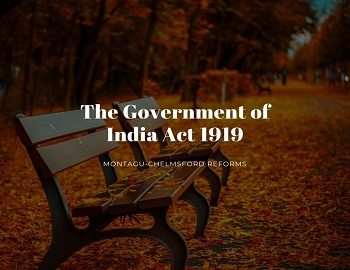The Government of India Act 1919:
Up to 1919, the national movement got intensified. The INC underwent the phase of the Rowlatt Satyagraha movement as well as the Home Rule Movement. Home Rule Movement which proved a precursor of the Gandhian mass Movement popularised the issue of Swarajya or Self-rule.
In the background of the Indian Council Act of 1919, there was an August declaration made by the government of Montague-Chelmsford. According to this declaration, the British objective in India was to promote self-governing institutions. This declaration was made on August 20, 1917.
But if we observe the actual provisions of the Indian Council Act of 1919, we come to the conclusion that this act came in contradiction with the basic contents of the August Declaration. The important provisions were such as-
- There was a provision for a bicameral legislative in the centre. But due to the property criteria attached to voting right the franchise was limited to the elite section in Indian Society. In central administration Indians got no participation in actual sense.
- In provinces, there was a provision of Dyarchy as a substitute for self-government. In other words, we can say that even at the provincial level Indians got limited participation. The actual executive power was vested in the post of governor. He was the real executive. Then the provincial subjects were divided into two sections the ‘Reserved Subjects‘ and the ‘Transferred Subjects‘. The main subjects were categorized into the Reserved Subjects like justice, police, and revenue on the other hand the relatively lesser important subjects like agriculture, education, public health, and public works, etc. were included in the group of Transferred Subjects. On the Reserved Subjects, the governor had to work at the advice of the executive council nominated by him. While Transferred Subjects, were administered by the Governor with the advice of ministers appointed by him from the elected members of the Legislature. Although overtly the dyarchy was declared to be a definite stage in the direction of self-government, on observation we find that this system created suspicion outside and conflict within. In other words, we can say Indian leaders became convinced about the thing that the government is not ready to permit Indians to participate in the government. Likewise, the division of subjects created some sort of conflict within the government. For example- if agriculture was a transferred subject, irrigation was a reserved subject. Likewise, if education was a transferred subject, finance was a reserved subject. So how was the progress could be made in the field of agriculture and education without the support of the government?
- Under the Act of 1919 the Central Legislature covered all central subjects, as also some matters falling within the scope of provincial subjects.
- No Bill of the Legislature could be deemed to have been passed unless assented to by the Governor-General. The latter could, however, enact a bill without the assent of the legislature.
- The Governor-General’s control over the Indian finances was also kept intact.
- The Act provided for the establishment, for the first time, in India of a Public Service Commission.
- Separate electorates were further extended to Sikhs in the Punjab and non-Brahmins in Madras. Also extended to Anglo Indians and Europeans.
- Part V of the Act provided for a Statutory Commission to be set up, at the end of ten years after the Act was passed, to inquire into “the working of the system of government”. The Simon Commission appointed in 1927, was the outcome of this provision.
The changes introduced by the Act of 1919 were far short of self-government. The Act only provided for partial transfer of power to the electorate through the system of dyarchy. It prepared the ground for federalism through the identity of provinces as administrative and financial units. But these measures were far too inadequate to satisfy the rapidly developing national aspirations. Tilak described the Act as ‘extremely disappointing and unsatisfactory’, and Congress decided to boycott the elections which were to be held in November 1920.
The Act of 1919 left three important issues for the Nationalists to debate and to launch their attack on the Government. These were-
- Absence of a responsible Government.
- Introduction of dyarchy.
- Expansion and consolidation of separate electorate.









Comments (No)